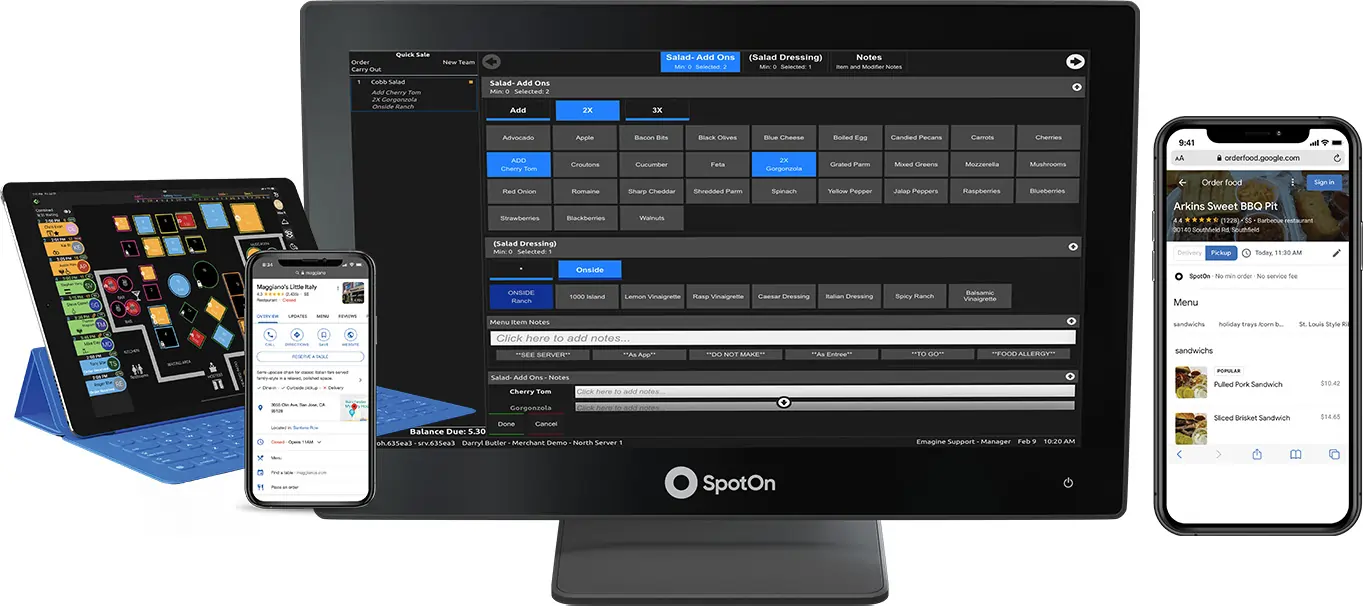In my experience, SpotOn POS is a fantastic option for both high-volume restaurants and small to mid-sized establishments. What truly sets it apart as a Point of Sale system is the extensive range of features it offers. From cloud-based POS software that supports seamless operations to tools like inventory tracking, sales analytics, and Customer Relationship Management (CRM), SpotOn is packed with capabilities designed to enhance retail management and efficiency.
I particularly appreciate its scalability, as it supports everything from selling online with integrated e-commerce solutions to multi-location management for expanding businesses. However, I’ve noticed that while SpotOn’s comprehensive feature set is impressive, many advanced tools come at an additional monthly cost. Despite this, the system’s versatility, reliability, and integrated payment solutions make it a strong investment for restaurants aiming to streamline operations and elevate guest experiences.
FAQ
Q: What is SpotOn POS?
A: SpotOn POS is a cloud-based point-of-sale system primarily focused on the restaurant and hospitality industry, though they also offer solutions for retail and field services. It bundles hardware (such as terminals and handheld devices – SpotOn Serve), software (including order taking, table management, online ordering, inventory management, and reporting), and integrated payment processing (SpotOn Payments) into a comprehensive platform.
Q: How much does SpotOn POS cost per month?
A: SpotOn uses quote-based pricing tailored to the business, often promoting bundled packages. While specific prices aren’t always listed publicly, expect monthly software fees (potentially starting around $25-$150+ per station, depending on the software package), hardware costs (purchased upfront or leased), and mandatory payment processing fees through SpotOn Payments. Total costs vary widely based on needs and negotiated terms.
Q: What are the most common complaints about SpotOn POS?
A: Common complaints found online often relate to aggressive or misleading sales practices, long-term contracts (often 3 years) that are difficult and expensive to cancel, issues with customer support (responsiveness, effectiveness in resolving technical problems), software bugs or glitches, and feeling locked into SpotOn Payments with potentially uncompetitive rates over time.
Q: Do I have to use SpotOn Payments with SpotOn POS?
A: Yes, almost certainly. SpotOn operates on a fully integrated model, bundling its POS software and hardware with its mandatory in-house payment processing, SpotOn Payments. Using a separate, third-party merchant account provider is generally not an option with their system.
Q: Does SpotOn require long-term contracts? Can I cancel easily?
A: Yes, SpotOn typically requires customers to sign long-term contracts, often for 3 years, covering software, hardware (if leased), and payment processing. These contracts usually include significant Early Termination Fees (ETFs), frequently requiring payment of the full remaining contract value, making cancellation very costly.
Q: Does SpotOn POS work offline if the internet connection goes down?
A: Yes, SpotOn POS systems generally include an offline mode. This allows the terminals to continue ringing up sales and securely queueing credit card transactions if the internet connection fails. Orders are stored locally and synced back to the cloud, with payments processed, once connectivity is restored.
Q: What kind of hardware does SpotOn use? Is it proprietary?
A: SpotOn offers a range of proprietary and third-party hardware options. They have their own branded terminals (like the SpotOn Register) and handhelds (SpotOn Serve), often running on Android. They also support certain compatible third-party devices and peripherals (printers, scanners, etc.). However, the hardware is typically provided as part of a bundle tied to their software and payment processing agreement.
Q: How is SpotOn’s customer support?
A: Reviews on customer support are mixed. SpotOn promotes 24/7 support. Some users report positive experiences with responsive help, especially during initial setup. However, many complaints involve long wait times, difficulty reaching support staff capable of resolving complex technical issues, unresolved tickets, poor communication regarding software updates or bugs, and challenges with billing or contract support.
Q: How does SpotOn POS compare to Toast for restaurants?
A: Both SpotOn and Toast are major players targeting the restaurant industry with comprehensive, integrated POS solutions (hardware, software, payments) and often require long-term contracts. Toast uses proprietary Android hardware and is known for deep restaurant features but faces heavy criticism for its contracts and support. SpotOn offers a similar feature set, potentially with more hardware flexibility in some cases (though often bundled), but also receives frequent complaints regarding contracts, sales tactics, and support consistency. Feature-wise, they compete closely, making the sales experience, specific module needs, and contract terms key differentiators.
Q: Are there hidden fees with SpotOn POS?
A: While SpotOn aims for bundled solutions, users should be vigilant about potential extra costs. Besides the core software and processing rates, look out for fees related to hardware leases vs. purchase, charges for add-on software modules (advanced reporting, marketing, loyalty), PCI compliance fees, potential premium support charges, and especially the substantial Early Termination Fees. Always get a detailed, itemized quote and meticulously review the contract and merchant agreement.







